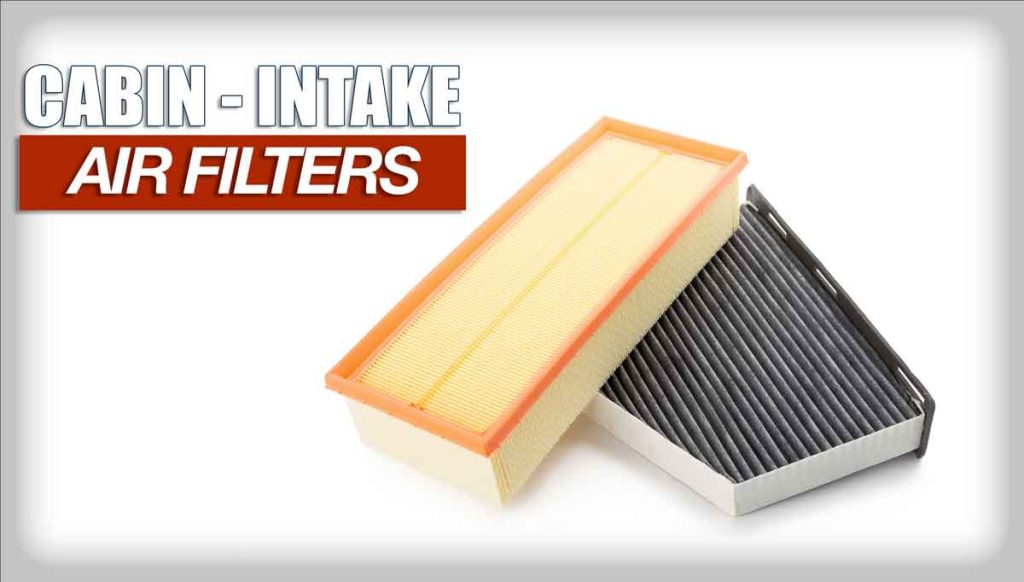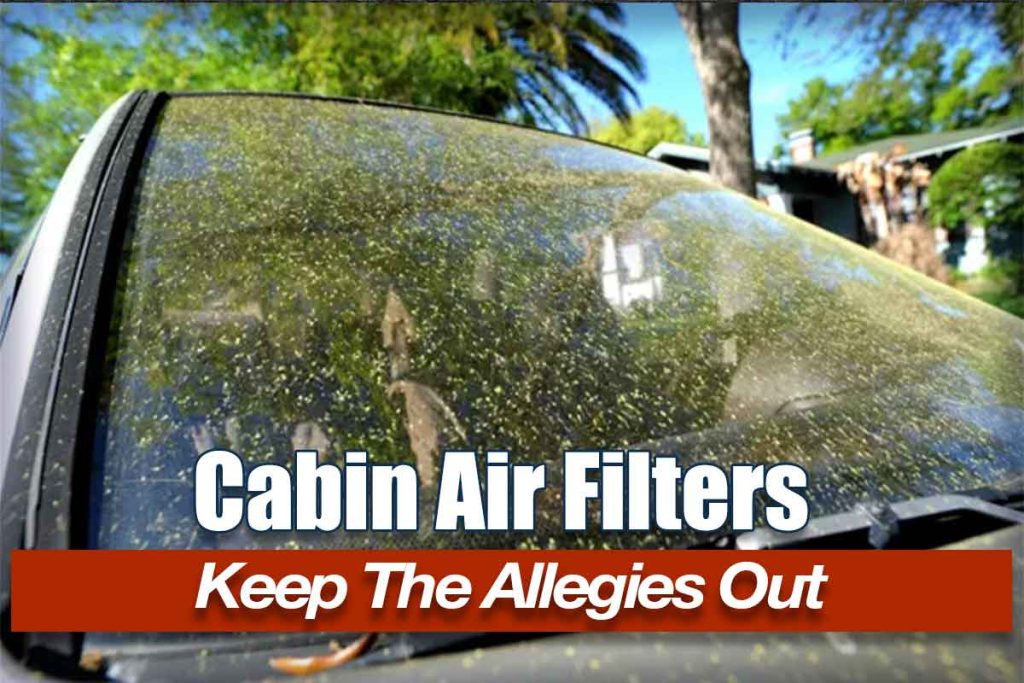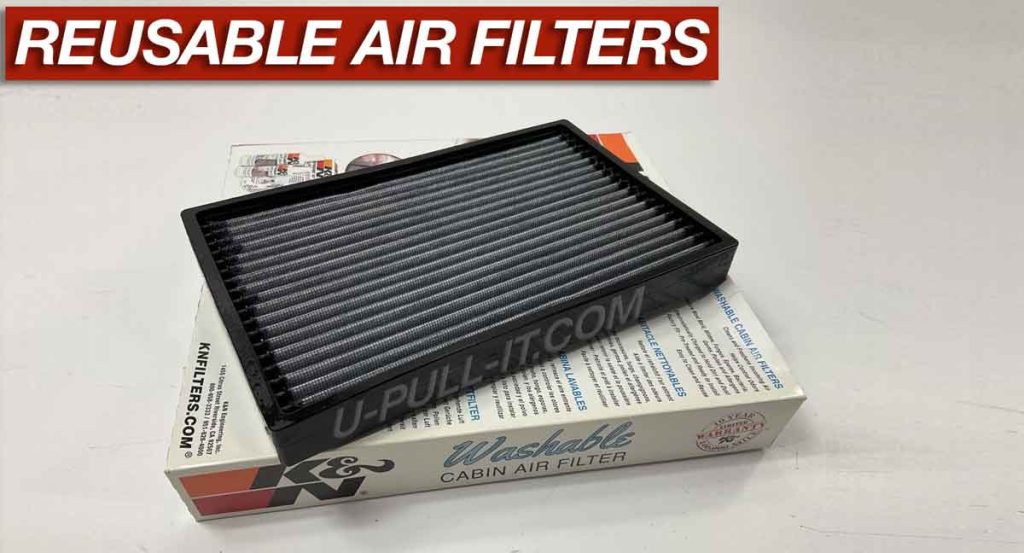Search Our Local Junkyards Database
Maintaining your car's health with AutoZone products, much like caring for your body, can save you from costly repairs if you follow the manual. Just as you need clean air to breathe, your car requires a clean engine air filter from AutoZone, as recommended in the manual, to function at its best and at a competitive price. This engine air filter from AutoZone acts as a protective barrier, trapping dirt and debris before they can enter the engine and cause harm, which can help save on future repairs. It's an unsung hero under your hood, working tirelessly to ensure that only the purest air mixes with fuel to power your vehicle.
But there's another guardian watching over the air you breathe inside the car—the cabin filter. While the engine air filter safeguards the heart of your vehicle, the cabin filter plays a crucial role in maintaining the quality of air inside your vehicle to save the products from contamination. It filters out pollen, dust, and other pollutants from the outside air, ensuring that you and your passengers can breathe easily.

Types of Car Air Filters: Intake and Cabin Filters
Understanding the different types of air filters and their prices in your vehicle is key to proper car maintenance, including whether they are standard products or require a special order. The engine air filter, also known as the intake filter, is crucial for protecting the engine from airborne contaminants. Its primary function is to purify the air before it enters the combustion chamber, preventing damage from dust, dirt, and debris. On the other hand, the cabin air filter is responsible for cleaning the air inside the vehicle, ensuring a healthier and more pleasant environment for passengers.
Standard Filters
Most cars come with standard filters. These need a change every 12,000 to 15,000 miles. They are made from paper-like materials that trap dirt and debris. This type keeps your engine safe without a big price tag and saves on shipping days.
Standard filters offer good protection for everyday driving. They're affordable which makes maintenance easy on the wallet.
Performance Filters
For those who want more from their car, performance filters are key. They allow more air into the engine with less filtration loss. This can be great for sporty rides, special order upgrades, or price-conscious consumers looking to save.
Using these might give a small boost in horsepower too. It's like helping your car breathe better so it can run faster.
Reusable Filters
Lastly, there are reusable filters that you wash and use again, which can save you money over time. Although they cost more upfront, they save money over time since you don't throw them away after one use.
These types also mean less trash because you aren't buying new ones often, there are people that find used car engine air filters at local junkyards, clean them up and reuse them themselves.
Benefits of Regular Replacement:
- Ensures engine protection by filtering out harmful particles before they can enter the combustion chamber.
- Maintains engine performance by allowing a clean and unrestricted air flow.
- Improves fuel efficiency as a clogged filter can strain the engine.
Optimal Timing for a Car Engine Air Filter Replacement
The best time to replace your air filter varies depending on driving conditions and vehicle make and model. Generally, it's recommended to change the engine filter every 12,000 to 15,000 miles. However, if you often drive in dusty conditions, you may need to replace it more frequently. For the cabin air filter, a common rule of thumb is to change it every year or every 12,000 to 15,000 miles. Always consult your vehicle’s maintenance schedule to determine the best timing for your specific car.
Key Points:
- Check your maintenance schedule for specific replacement intervals.
- Replace more often if you drive in dusty conditions.
- A check engine light can sometimes indicate a clogged air filter.
The Crucial Role of the Engine Air Filter
The engine air filter is a vital component of your car’s air intake system. It ensures that the air mixed with fuel for combustion is free of dust and abrasive particles. This protection is crucial as it helps to maintain the engine's performance, prevents mechanical issues, and extends the engine’s lifespan. A well-functioning engine air filter is a simple yet effective way to ensure your vehicle’s engine receives the clean air it needs.
Factors to Consider:
- The air intake system‘s health is directly linked to the engine's performance.
- A clogged air filter can lead to reduced performance and increased emissions.
- Replacing your air filter as soon as possible can avoid long-term engine damage.
How a Clean Air Filter Benefits Your Car's Engine Performance
A clean air filter can significantly impact your car’s performance. It allows for the appropriate amount of air to enter the engine, facilitating optimal combustion and engine efficiency. This, in turn, leads to smoother acceleration, better fuel economy, and reduced emissions. A new air filter also helps prevent contaminants from entering the engine, which can save you from expensive repairs.
Advantages of Timely Replacement:
- Optimized engine performance due to improved airflow.
- Enhanced fuel efficiency by maintaining the correct air-to-fuel ratio.
- Reduced risk of expensive engine repairs due to debris entering the engine.
Recognizing the Signs: When to Change Your Air Filter
Knowing when to replace your air filters is vital for maintaining your vehicle's health. A visual check can reveal a dirty air filter, but other signs include reduced horsepower, unusual engine sounds, or a decrease in fuel efficiency. If the filter appears dirty or clogged, it’s best to replace it as soon as possible.
Indicators that Your Air Filter Needs Changing:
- Visible dirt and debris on the filter.
- An illuminated check engine light could sometimes be a symptom.
- A noticeable decrease in fuel efficiency.
Selecting the Right Air Filter for your Car
Compatibility
It's vital to choose a car air filter that fits your vehicle. A wrong size can cause harm or not work well. Always look at what the car maker says you should use.
A filter must fit your car's make, model, and engine. If it doesn't, it won't clean the air right or could break. For example, a Honda Civic needs a different filter than a Ford F-150.
Filtration Efficiency
The power of an air filter is in how well it catches dirt and dust. The better it works, the cleaner your engine will be. But too much filtering can slow down airflow.
An efficient filter stops tiny particles from getting into the engine. This helps keep everything running smoothly and cleanly. Think about balance: good filtration but still letting enough air through.
Airflow Considerations
Engines need to breathe to work best. A bad filter can choke an engine by blocking airflow, making less power come out.
Good design means finding middle ground between catching debris and keeping air moving freely to the engine parts that need it most. Filters shouldn’t get in the way of performance; they should support it while cleaning up what gets inside.
Engine Air Filters: Balancing Protection and Performance
Engine air filters are designed to balance protection of the engine with maintaining optimal performance. High-quality filters like K&N® high-flow air filters offer enhanced filtration without sacrificing airflow. These filters are designed to increase horsepower and acceleration while providing high levels of engine protection.
Why Choose High-Quality Filters:
- They ensure the engine gets the clean air it needs without restricting flow.
- K&N air filters are a reusable product that lasts, reducing waste.
- They are custom-designed to fit your car make and model, ensuring a perfect fit and optimal performance.
The Unsung Hero: The Cabin Air Filter
The cabin air filter is an essential component for maintaining good air quality inside your vehicle. It acts as a barrier against pollutants, trapping dust, pollen, and other airborne materials before they can enter the cabin. Regular replacement of the cabin air filter ensures a fresher, cleaner driving experience, especially for those with allergies or respiratory concerns.
Key Benefits of a Clean Cabin Air Filter:
- Improves air quality inside your car, providing a healthier environment.
- Protects passengers from airborne contaminants and allergens.
- Enhances HVAC system performance, leading to better airflow and temperature control.

Cabin Filters and Allergies: Breathe Easier This Spring
For allergy sufferers, the cabin air filter is a line of defense during allergy season. A filter that’s in good condition can help reduce the symptoms of pollen allergies by removing allergens from the air circulating inside your car. It's crucial to choose a filter media that can effectively remove these particles from the vehicle’s air.
Choosing the Right Cabin Air Filter:
- Look for filters that can remove fine particles responsible for allergies.
- Replacing your cabin air filter regularly will help keep the air clean.
- Selecting a high-quality filter ensures better filtration and longevity.
Installation Tutorial
Tools Required
Before starting the installation of your car air filter, gather the right tools. You'll likely need a screwdriver and possibly some pliers. These are common in most toolboxes. No need to worry about fancy equipment; these simple tools will do the trick.
Using proper tools helps you get the job done quickly and safely. It's important not to force anything that doesn't fit right or seems stuck. If it's hard to move, double-check if there's another screw or clamp you missed.
Step-by-Step Guide
Now let’s dive into replacing your car air filter with a clear step-by-step approach:
- Start by opening your car’s hood and locating the air filter housing.
- Remove any clips or fasteners holding the cover in place using your screwdriver.
Next, carefully remove the old filter and note how it sits inside its housing – this is crucial for correctly installing the new filter.
- Place your new high-performance filter exactly where the old one was.
- Securely fasten any clips or screws that hold it in place.
Make sure everything looks snug and well-fitted before closing up.
Following these steps ensures correct placement of your new air filter, which can enhance engine performance as discussed earlier regarding high-performance filters' benefits. A secure fitment also prevents unfiltered air from entering your engine—a must for keeping things running smoothly!
The Top Car Air Filter Brands and Their Unique Advantages
Choosing the right air filter brand for your car can make a significant difference in performance and engine health. Brands like K&N are renowned for their high-quality filters, which provide excellent filtration without restricting airflow. They are designed to increase horsepower and are often a reusable product that lasts for the lifetime of your vehicle, contributing to less waste.
What Sets Apart the Top Brands:
- Engineered for performance: Filters from leading brands are designed to enhance airflow and engine efficiency.
- Durability: Top brands offer filters that last longer, often made with robust filter media that withstands the test of time.
- Vehicle specificity: The best air filters are tailored to fit specific car models, ensuring proper fit and function.
Why Some People Prefer One Brand Over Another
Individual preferences for air filter brands can vary based on a variety of factors. Some drivers might prioritize the filter’s ability to improve fuel efficiency or enhance horsepower, while others may focus on longevity and cost-effectiveness. Additionally, brand loyalty can play a role, with some drivers preferring brands they’ve used and trusted for years.
Choosing Your Brand:
- Consider the specific needs of your car engine and driving conditions.
- Weigh the benefits of disposable versus reusable filters.
- Consult reviews and testimonials to gauge user satisfaction with different brands.
Disposable Air Filters
Materials: Typically made from paper filter media, disposable air filters are designed to provide effective filtration and are usually housed within a plastic box. These are cost-effective and can be easily replaced.
Benefits:
- Cost-Effective: Generally less expensive upfront than reusable options.
- Convenience: Simply replace the old filter with a new one, no cleaning required.
- Performance: Good-quality disposable filters effectively remove particles from entering the engine.

Reusable Air Filters
Materials: Reusable filters, such as those offered by K&N®, often use a fabric filter media that can be cleaned and re-oiled. These are housed in a durable air box that lasts through the vehicle's lifespan.
Benefits:
- Longevity: Can last as long as your car with proper maintenance.
- Environmentally Friendly: Helps reduce unnecessary waste; one reusable filter can replace many disposable ones.
- Cost Savings Over Time: Though more expensive initially, they can be more economical over the life of the vehicle.
Both types of filters play an essential role in preventing contaminants from reaching the combustion chamber and ensuring that the engine functions properly.
Cleaning and Maintenance: Disposable filters cannot be cleaned—they must be replaced once they've reached their capacity. Reusable filters, however, can be cleaned with a special solvent and re-oiled, making them a performance air component that functions properly over many cleaning cycles.
Below is a table summarizing the key points about disposable and reusable air filters:
| Feature | Disposable Filter | Reusable Filter |
|---|---|---|
| Material | Paper filter, plastic box | Fabric filter, durable air box |
| Lifespan | Single-use | Long-term with maintenance |
| Maintenance | Replace when dirty | Clean and re-oil periodically |
| Cost | Lower upfront cost | Higher initial investment, but cost-effective over time |
| Environmental Impact | Contributes to waste | Reduces unnecessary waste |
| Suitability | Good for regular use | Preferred for performance and eco-conscious drivers |
Remember to check your vehicle's air filter regularly and change it when necessary. Depending on your car's needs and your personal preferences, you can choose the filter that best suits your maintenance routine.
Conclusion: The Importance of Regular Air Filter Maintenance
Maintaining the air filters in your car is a critical aspect of vehicle upkeep that has direct implications for engine health, performance, and cabin air quality. Regular checks and replacements of both the engine and cabin air filters can prevent a multitude of issues and contribute to a more efficient, clean, and enjoyable driving experience. Not only does this help keep your car running smoothly, but it also contributes to environmental efforts by potentially reducing the need for 100 million disposable air filters annually.
Why Regular Maintenance Matters:
- Ensures that your engine functions properly and efficiently.
- Helps prevent particles from entering the engine, safeguarding against damage.
- Enhances overall vehicle performance, including fuel economy and emissions.
By understanding the roles and benefits of the vehicle's air filter, you can make informed decisions about their maintenance, ensuring that your car loves you back with years of reliable service.
Frequently Asked Questions
What is the primary function of a car air filter?
Car air filters trap contaminants, ensuring clean air enters the engine for combustion, which is crucial for vehicle performance and longevity.
Can I use any type of air filter in my car?
No, you must select an air filter compatible with your vehicle's make and model to ensure proper fit and function.
How often should I replace my car's air filter?
Replace your car's air filter every 12,000 to 15,000 miles or as advised by the manufacturer’s guidelines for optimal performance.
Are high-performance air filters worth the investment?
Yes, high-performance filters can improve airflow and engine efficiency, potentially enhancing acceleration and fuel economy.
Is it difficult to install a new car air filter myself?
Most car owners can install a new air filter easily; it typically requires few tools and minimal technical knowledge. Follow an installation tutorial if unsure.
What maintenance is required for a car's air filter?
Regularly check your air filter for debris buildup and clean or replace it as necessary to maintain good airflow to the engine.
Do specialty filters really make a difference compared to standard ones?
Specialty filters like those designed for allergen reduction or off-road conditions provide specific benefits that standard filters may not offer.


